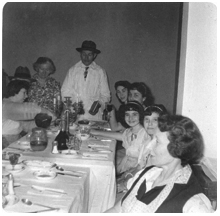Why is this night different from all other nights?
Laptops and cell phones blur the line between office and home.
By Amy Braverman Puma
At my family’s Passover seder a couple years ago, 30-some relatives sat around my aunt and uncle’s paper-covered tables, noshing on matzoh and pickles put out before the meal. Earlier that evening my husband and I had shared the news that we were expecting a baby, and they showered us with hugs and questions. I was still riding that high at the table, happy to participate in a family tradition and to anticipate bringing my own child into the mix.

No cell phones at Mom's childhood seders.
Then my Jewish-Rockwell vision wilted. One cousin, a lawyer at a big Chicago firm with two grade-school kids, was hardly in his seat. He spent most of the evening outside on his BlackBerry—a business call. I remember thinking, both sympathetically and judgmentally, he can’t take one night off? On the day we’re supposed to recline at the seder to mark our freedom from slavery?
Fast-forward a few months. That summer the Magazine’s office moved downtown, and the staff got laptops so we could do reporting on campus one day, write and edit in the office another. I didn’t realize what else the laptop signified: we were joining that 24/7 world my cousin belonged to, where leaving the office didn’t mean leaving work.
Sure, we editors already took work home. Many of us did our best writing at night, and we brought home printouts of Alumni News to read while curled up on the couch. Longtime editor Mary Ruth Yoe walked to the Hyde Park office regularly on Saturdays. (I thought the move downtown would stop her, but old habits die hard, especially with Metra’s convenience.) But before we got our laptops, we weren’t continuously connected. We still separated home life from work life.
Nowadays after work, my husband and I entertain, feed, bathe, and dress our toddler. When he and his dad head to his room for books and bedtime, I head to the desk and turn on the computer. Has anyone e-mailed me in the two hours I’ve been home? Often the answer is yes: another editor has finished an assignment, for example, and it’s ready for a look. Or a few of us are online, and we get questions answered or stories edited that night. Even if I wait until morning to act on these notes, I still know what’s there.
The blurred line between home and work has become the norm. One weekend this February a colleague visiting family in North Carolina e-mailed a few projects back from “the homeland,” as she calls it. Was it a shame she had to mix work with a family visit, or nice that she had the flexibility to do both? For me the positives balance the negatives: although my mind doesn’t get much of a break, I can spend more time with my son. With the laptop I work from home one day a week, making up for my divided attentions in the evening.
Our office isn’t extreme: we’re not expected to be available at all hours, and I don’t imagine being attached to my cell at this year’s seder—especially after my aunt banned phones last year. But with laptops and BlackBerries, we always could be working. We have to try to take a day of rest.
But no rest yet
Some staffing changes to report: Mary Ruth Yoe, who has edited the Magazine weekdays and weekends since 1989, has been named executive editor. She’s still taking those Metra trips to the office—after all, she hasn’t yet taught me everything she knows. While supervising this publication, she now also edits the University’s other Alumni Relations and Development writing projects. I’ve taken over day-to-day Magazine duties.
Meanwhile Jason Kelly, who spent 14 years reporting, writing, editing, and doing Web work at Indiana’s South Bend Tribune, has signed on as associate editor, writing features and editing Chicago Journal. Joy Olivia Miller, a graphic designer for us from 1999 to 2004, has rejoined the Magazine in a new position, interactive-content editor, enriching our Web presence daily (see uchiblogo.uchicago.edu for examples). And Elizabeth Chan, with a journalism degree from the University of Missouri, has already proved indispensable as fact-checker and proofreader. We still expect readers to point out our mistakes, but we hope to have fewer such missives waiting in our inboxes each evening.
